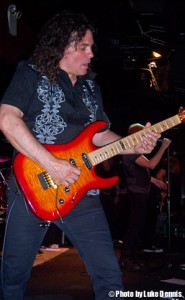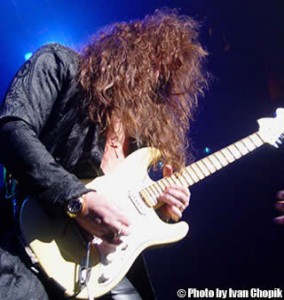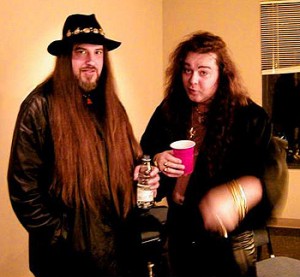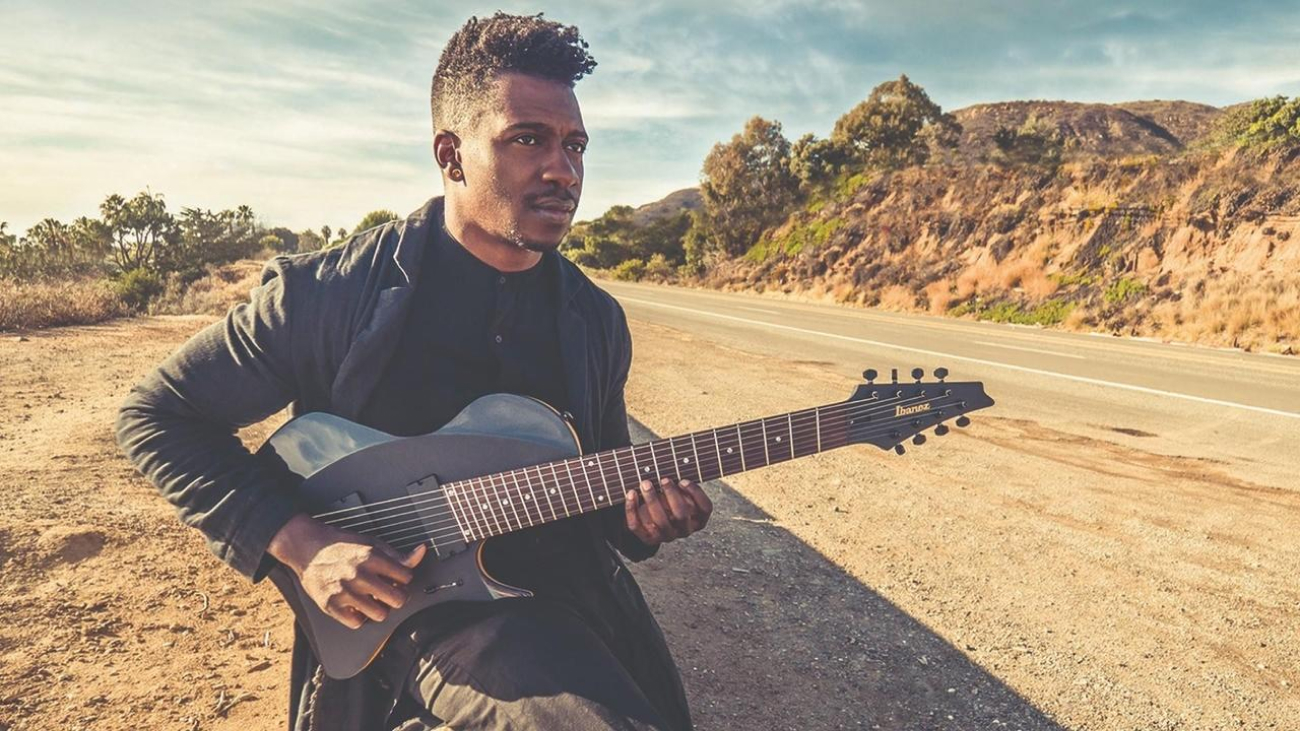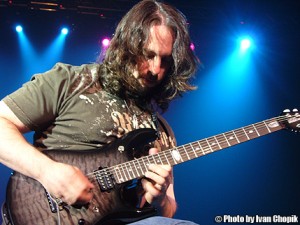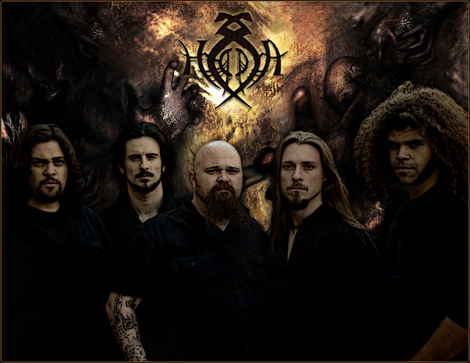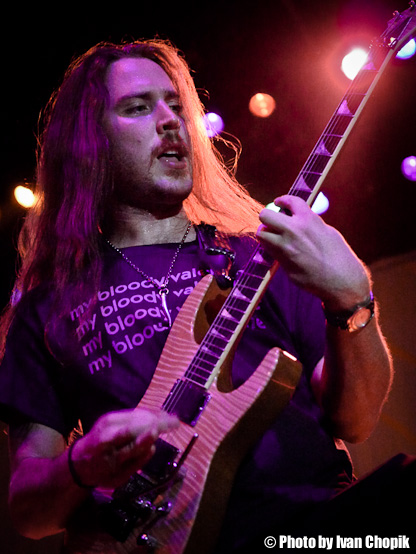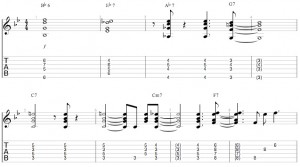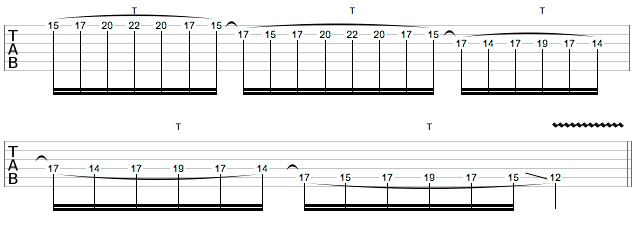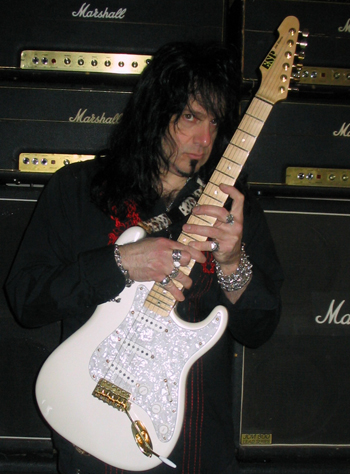 Shredlord Joe Stump is a professor at Berklee College of Music and is the head of the department of metal. GuitarOne Magazine rated him as one of the Top 10 Shredders of All Time. One of the leaders of the modern neoclassical metal scene, Joe has released seven solo albums and 4 more additional albums with his band Reign of Terror. Look out for upcoming releases later this year from his new band Holy Hell, as well as his new instrumental solo album. For more info on Joe and his music, visit www.joestump.com.
Shredlord Joe Stump is a professor at Berklee College of Music and is the head of the department of metal. GuitarOne Magazine rated him as one of the Top 10 Shredders of All Time. One of the leaders of the modern neoclassical metal scene, Joe has released seven solo albums and 4 more additional albums with his band Reign of Terror. Look out for upcoming releases later this year from his new band Holy Hell, as well as his new instrumental solo album. For more info on Joe and his music, visit www.joestump.com.
IC: 2005 was a very busy and successful year for you. What do you have planned for 2006?
JS: Right now I’m working on a couple of records. I’m recording the Holy Hell record, which will be out sometime in the fall on Magic Circle/SPV worldwide. Then there’ll be a big world tour in the fall, beginning in the States. It’s the same package that went out in June 2005, which featured Manowar, Rhapsody, and Holy Hell – the Demons, Dragons, and Warriors tour.
In addition, I’m also working on a new solo record, which I’ll probably end up recording before the fall. That’ll probably come out after the Holy Hell record is released, because that too is gonna be on Magic Circle/SPV… meaning I got a new solo deal cooking now with a larger company, which means much larger distribution and a lot more money behind my release. I’ll be rich in no time! [laughs]
IC: Tracking back a few years, how did you get started with playing the guitar and what inspired you to pursue a career in music?
JS: Well, I played the guitar a little when I was 10, ‘cause I used to watch the Glenn Campbell Show and I thought it was cool. Back then, when I was a kid in the early 70’s, Glenn Campbell and Johnny Cash had regular shows on TV. And then I played a little bit out of Mel Bay’s Easy Way and that horseshit… you know, this is an E this is a B. All on some piece of shit rental guitar.
Then I kind of got sick of it and didn’t pick it up again until I was 13 or 14, just being inspired by all the rock of that time, all the great guitar players of the ’70s… Michael Schenker with UFO, Ritchie Blackmore with Deep Purple, Hendrix, and Jeff Beck, Tommy Bolin, Rory Gallagher, Robin Trower, Frank Marino… the ’70s was a great time for rock guitar. I was lucky enough that even when I was kind of stinky, I was playing in a band only a little bit after I started and we used to play at dances and shit like that when I was like fourteen. Then when I got to be fifteen, sixteen, seventeen we were playing in bars. 11th and 12th grade I was playing in a club like three times a week. So I didn’t have much time for school or any of that. I was going to high school with a hangover. [laughs]
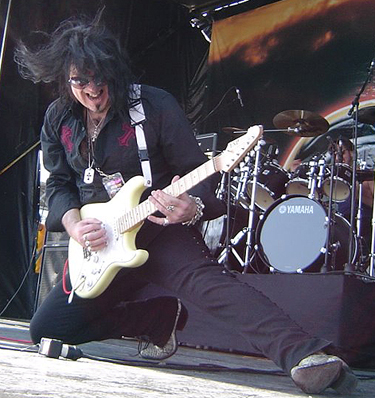 IC: You already mentioned some of your musical influences. Who else influenced your style?
IC: You already mentioned some of your musical influences. Who else influenced your style?
JS: When I was at Berklee, I used to listen to a lot of Jazz and Fusion guys. I was heavily into Al Di Meola. He was one of the guys that drove me to come to Berklee. That kind of blew me away when I was just about to come here and I heard somebody play electric guitar that fast. It was a step up from all the other guys like Blackmore and Schenker. But I mean my main guitar guys are Blackmore, Schenker, Yngwie [Malmsteen]; of course, has a massive impact on my playing. Gary Moore, Uli Jon Roth, Jimi. Those are my big six guys, but I love some of the other guys I mentioned, as well.
IC: What’s the writing process like for you? What comes first? The groove? The melody?
JS: If I write a really strong theme or a strong melody, I always write the melody first. Sometimes, I’ll write a chord groove and then all of the sudden I’m vamping on it with the drums and I just hear a melody. A lot of times when I’m writing a melody, I’m thinking of what kind of groove it’s going over. But I never write a chord sequence and then a melody to it.
The only time I do that is if I’m writing a vocal tune. But also if I write a vocal tune, sometimes I’ll write the melody and then I’ll write the chords behind the melody. So it’s kind of different each time, but as fast as a lot of the shit that I play is, a lot of my music has very strong themes and melodies, as opposed to some of the other guys that make those kinds of records that just sound like fuckin’ guitar exercise. So it’s really organic, I always hear it in my head and then write the chords around it.
IC: Let’s talk a bit about your gear: guitars, amps, effects. What kind of stuff do you use?
JS: I have a billion guitars, but I have an ESP endorsement, so they built me six custom shop Strats and they have all kinds of features… locking tuners, scalloped neck, and I have a DiMarzio endorsement so I use DiMarzio pickups. I use the YJM Malmsteen signature pickup in the neck and then I use the HS-3 in the back, or sometimes a Fast Track or Virtual Vintage Soloist, which is another really good DiMarzio pickup.
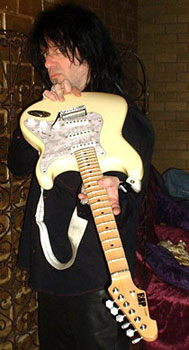
Joe showing off his ESP signature model
As far as amps go, it’s always Marshall. I have a bunch of old heads from the ’70s – some early ’70s heads with no master volume and then some later ’70s heads with the master volume. And I also have two other amps. I have an ENGL Ritchie Blackmore Signature amp, which is a great sounding amp. And I have the Rhino Yngwie Malmsteen signature amp, which was only around for a short period of time. It’s just a carbon copy of his favorite 50-watt head that he used on many of his records and it sounds great.
When I put it next to one my 50-watt Marshalls from the 70’s, one of my better ones, it sounds almost identical, because that’s all it is. The guy at Rhino told me they just got a Russian engineer and Yngwie’s favorite Marshall and said ‘clone that.’ So it’s just a Marshall in a Rhino case. But both of these amps sound great, I use them all the time. And then with the ‘Holy Hell’ thing I was actually using the Marshall JMP-1 preamp and the Marshall all-tube 100-watt power amp, which actually sounds quite good as well.
Effects wise, I’ve got a bunch of Boss stuff on the floor – Delay, Flanger, Phase Shifter, and an Octave-box. And I use the old trusty DOD pedals that I’ve been using since like 1987 or 1988. I saw one in the Yngwie video on his pedalboard and I was like ‘Eh, fuck it. Yngwie’s using it, it’s gotta be cool!’ Then I saw it in the junk bin of a music store and I bought it. I have a bunch of those, the old grey and the old yellow ones, plus I have a bunch of the Yngwie signature pedals, which are just a little bit less noisy and a little cleaner. But I’ve got a bunch of different distortion boxes that I use for different things. I’ve a got modified FuzzFace and a copy of a Hornsby Skewes Treble Booster, which is a distortion pedal Blackmore used back in the early Rainbow days. The guy that actually modded Blackmore’s did the mods on mine, so I got the whole Ritchie thing going on with it.
IC: What would you say are the defining highlights in your career?
JS: I guess it’s all the things that come along with it, like all the endorsements… you get free guitars in the mail, which is kind of nice. You get a guitar built with your name on the headstock and it’s built for you, and all that kind of stuff. All those things are really nice. And I’ve played many shows in many different countries all over the world and I love the travel. But for me it doesn’t matter, I love to play. Whether I’m playing in Europe with my own thing in a pub with 250 people, or I’m playing in a festival in front of 10,000 people, to me it’s the same shit. I love to play, so it’s not like I get nervous in front of more people, only if my shit doesn’t work.
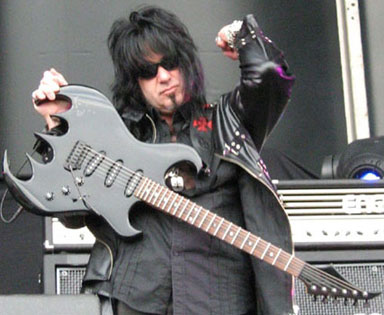 I was playing a festival in the Czech Republic, the biggest show I’ve played, (18,000 people) and my guitar rig was all fucked up. I had to play the whole show with my guitar sounding like a nasty bumblebee… horrible. I mean, I bit the bullet and played good and all that, but it was quite a painful experience. But I lived through that… that would be one of the low points. And being in the guitar magazines that I always read… the first time I was in Guitar World, first features and stuff, getting great reviews and being compared to guys that were my heroes that are now like my peers, or whatever. All that kind of shit is really gratifying. You work hard and it’s nice to get recognition from things like that.
I was playing a festival in the Czech Republic, the biggest show I’ve played, (18,000 people) and my guitar rig was all fucked up. I had to play the whole show with my guitar sounding like a nasty bumblebee… horrible. I mean, I bit the bullet and played good and all that, but it was quite a painful experience. But I lived through that… that would be one of the low points. And being in the guitar magazines that I always read… the first time I was in Guitar World, first features and stuff, getting great reviews and being compared to guys that were my heroes that are now like my peers, or whatever. All that kind of shit is really gratifying. You work hard and it’s nice to get recognition from things like that.
IC: You obviously spend a lot of time on your music. What do you like to do outside of that?
JS: I love to watch the New York Yankees. Except when they lose, then it’s all a bit more painful. I’m a huge Yankee fan so during the baseball season I watch the Yanks, go to games and stuff. And then I like to travel and go on vacation, go different places. I’m a city guy, so I go back home to New York and hang out in New York City, or I go down to New Orleans, or different things like that. I’m not like a laying on the beach kind of guy in a vacation, I’m more on the street.
IC: Instrumental guitar-oriented music has been regaining some popularity and getting more exposure in magazines and on the Internet. Where do you see this style of music going in the future?
JS: Well, I don’t think it’s ever going to explode like it did when it first happened, decades ago in the 80’s during the shred craze. But proficient playing is certainly coming back in a big way and a lot of it is because a lot of the younger players were kind of fed up thinking there’s got to be more to doing this that these clowns that are making records in this day and age… all that false metal, grindcore horseshit metal, and stuff that they pass off as metal.
Guys that are playing guitar get tired of listening to guys who can only play two chords. Especially some of the younger guys now making records are listening to their Dad’s record collection that has all this shred playing and all these burning guitar solos and they’re like ‘Oh fuck, that’s the way it used to be. I better start practicing!’ So I mean it’s definintely starting to come back, which is great.
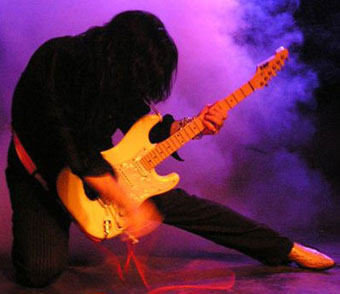
IC: Where do you see yourself 10 years from now?
JS: I’ll hopefully have, with the amount of exposure I’ll get with the larger record deal now, (I’m in a band. The ‘Holy Hell’ thing has got a lot of money pumped behind it) my touring and clinic schedule probably will be more hectic and heavier.
Obviously I’ll still be working at Berklee, doing my thing here. I don’t think that’s really going to change at all. I’ll still be making records and touring and all that kind of stuff. I don’t anticipate retiring or any crap like that by any means. So I would imagine having many more tours, shows, and records under my belt – reaping the rewards of all my hard work hopefully.
IC: What advice can you give to young, aspiring musicians?
JS: If you’re really serious about playing and you really love it, then that’s what you should do. But you shouldn’t be fucking around. I’ve been playing guitar for over 30 years and I still play for hours and hours a day. I love to play. All the students are at that age where they should be living, eating, breathing, sleeping their instrument if that’s what they really want to do. That’s what you have to do, because guess what, everybody plays fucking good, who cares? And if you don’t have that kind of dedication, then you’re certainly in the wrong place.



